新概念英语二册超详教案讲义笔记Lesson 54 Sticky fingers 粘糊的手指
文档属性
| 名称 | 新概念英语二册超详教案讲义笔记Lesson 54 Sticky fingers 粘糊的手指 | 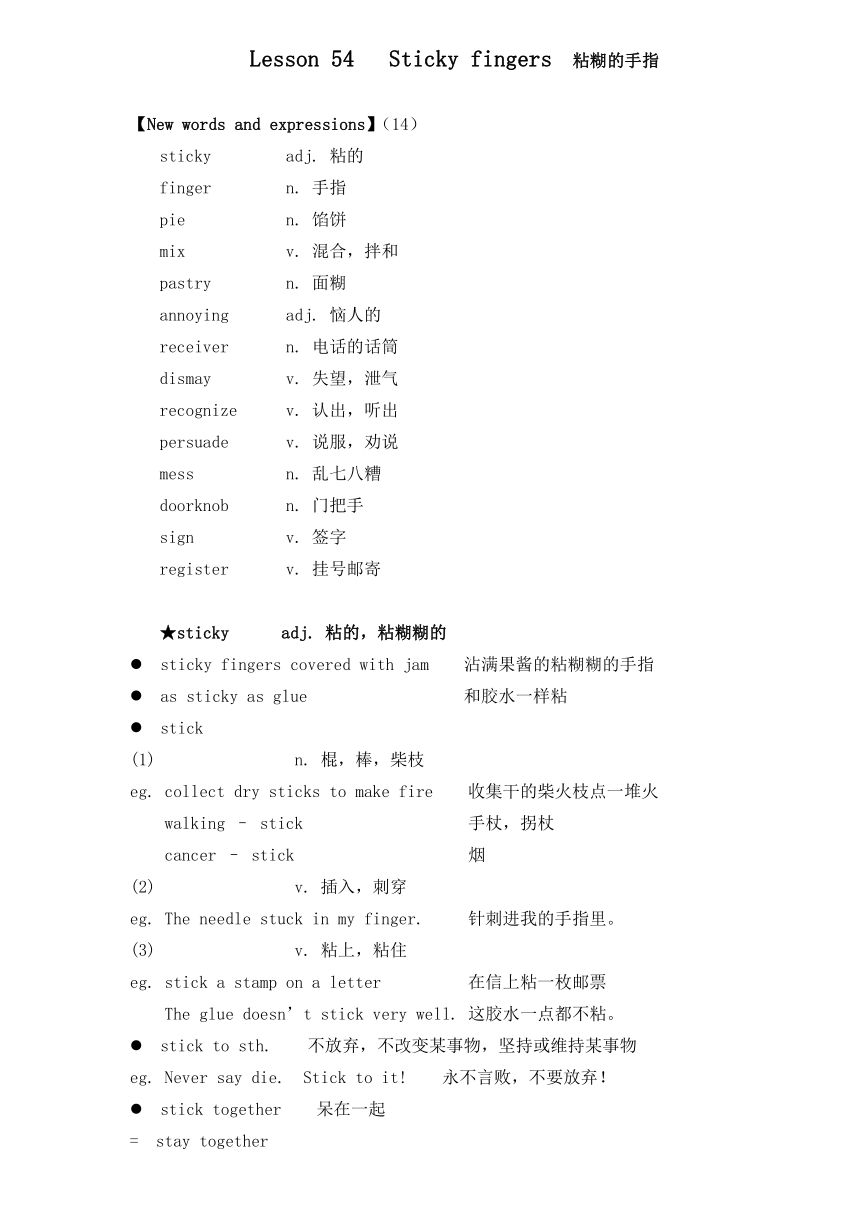 | |
| 格式 | docx | ||
| 文件大小 | 39.7KB | ||
| 资源类型 | 教案 | ||
| 版本资源 | 新概念英语 | ||
| 科目 | 英语 | ||
| 更新时间 | 2023-09-26 07:01:01 | ||
图片预览

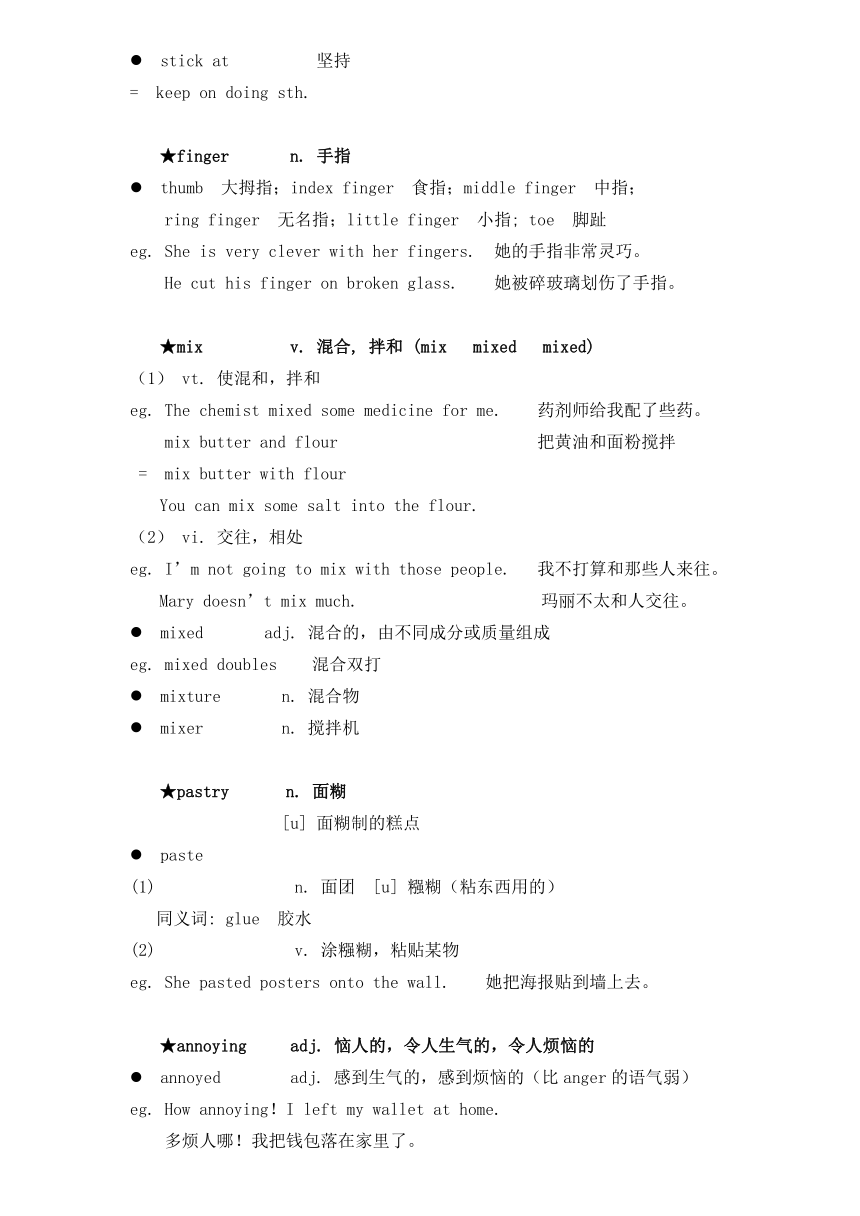
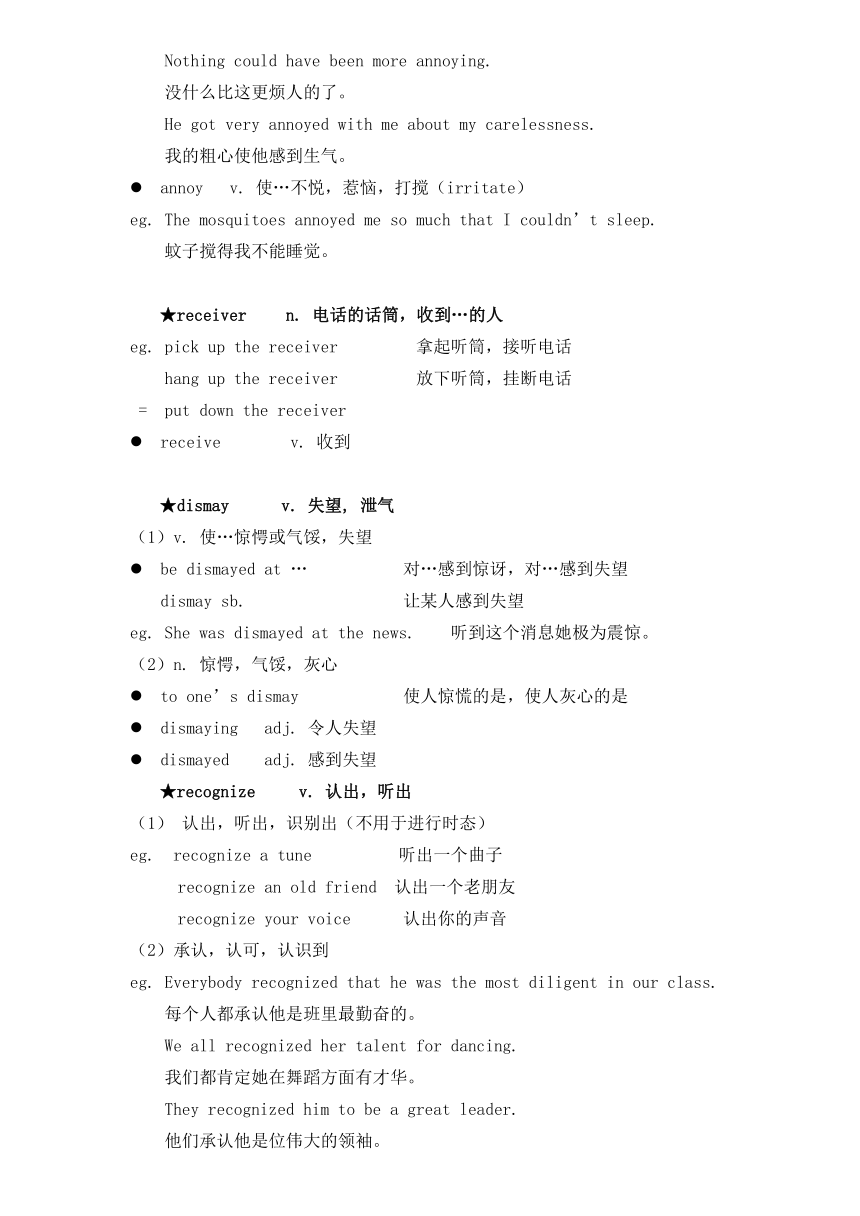
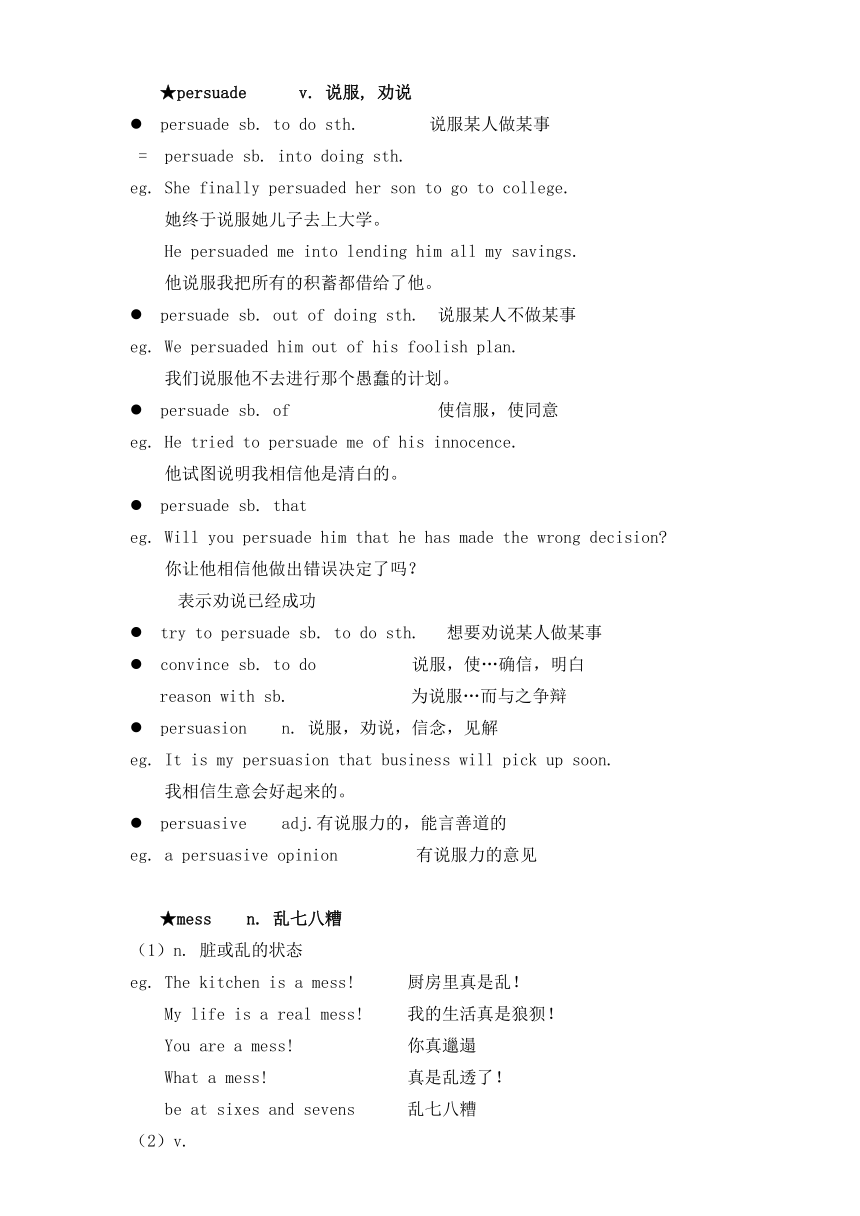
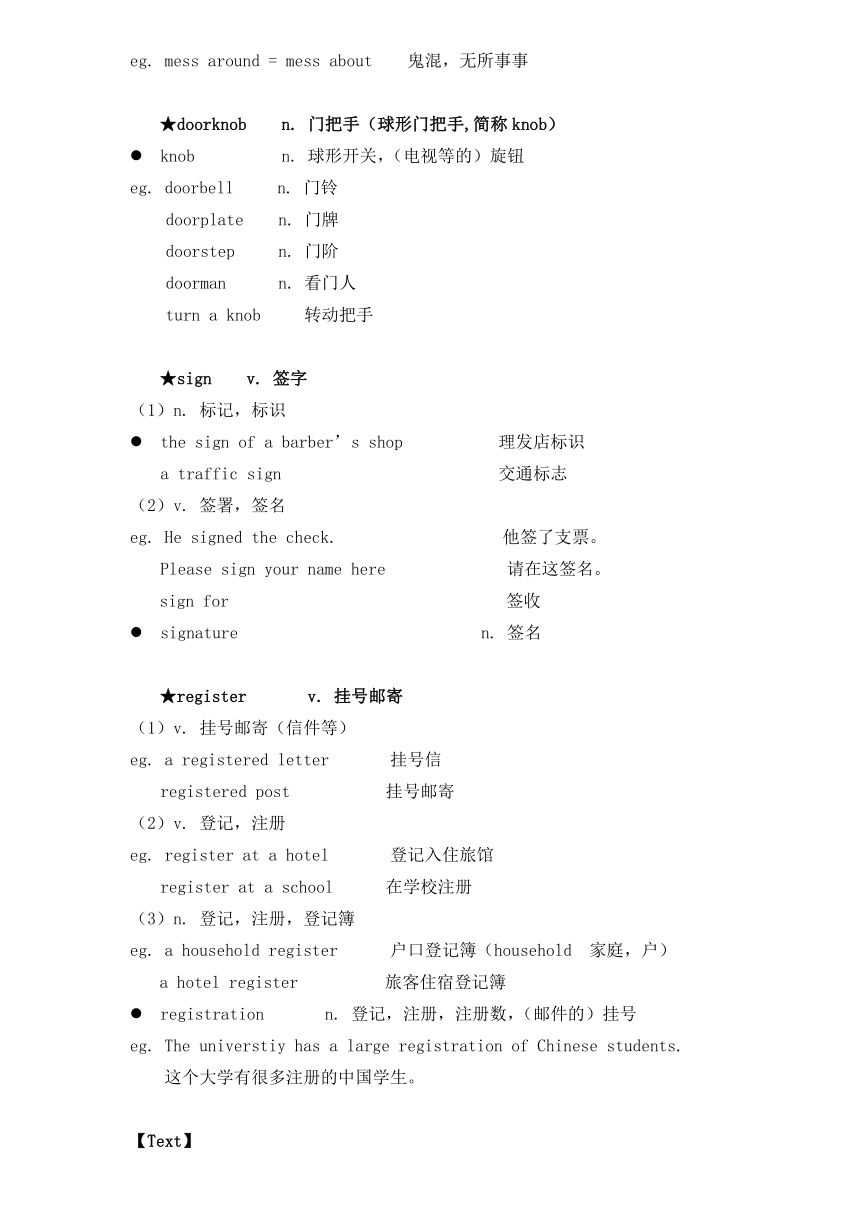
文档简介
Lesson 54 Sticky fingers 粘糊的手指
【New words and expressions】(14)
sticky adj. 粘的
finger n. 手指
pie n. 馅饼
mix v. 混合,拌和
pastry n. 面糊
annoying adj. 恼人的
receiver n. 电话的话筒
dismay v. 失望,泄气
recognize v. 认出,听出
persuade v. 说服,劝说
mess n. 乱七八糟
doorknob n. 门把手
sign v. 签字
register v. 挂号邮寄
★sticky adj. 粘的,粘糊糊的
sticky fingers covered with jam 沾满果酱的粘糊糊的手指
as sticky as glue 和胶水一样粘
stick
n. 棍,棒,柴枝
eg. collect dry sticks to make fire 收集干的柴火枝点一堆火
walking – stick 手杖,拐杖
cancer – stick 烟
v. 插入,刺穿
eg. The needle stuck in my finger. 针刺进我的手指里。
v. 粘上,粘住
eg. stick a stamp on a letter 在信上粘一枚邮票
The glue doesn’t stick very well. 这胶水一点都不粘。
stick to sth. 不放弃,不改变某事物,坚持或维持某事物
eg. Never say die. Stick to it! 永不言败,不要放弃!
stick together 呆在一起
= stay together
stick at 坚持
= keep on doing sth.
★finger n. 手指
thumb 大拇指;index finger 食指;middle finger 中指;
ring finger 无名指;little finger 小指; toe 脚趾
eg. She is very clever with her fingers. 她的手指非常灵巧。
He cut his finger on broken glass. 她被碎玻璃划伤了手指。
★mix v. 混合, 拌和 (mix mixed mixed)
(1) vt. 使混和,拌和
eg. The chemist mixed some medicine for me. 药剂师给我配了些药。
mix butter and flour 把黄油和面粉搅拌
= mix butter with flour
You can mix some salt into the flour.
(2) vi. 交往,相处
eg. I’m not going to mix with those people. 我不打算和那些人来往。
Mary doesn’t mix much. 玛丽不太和人交往。
mixed adj. 混合的,由不同成分或质量组成
eg. mixed doubles 混合双打
mixture n. 混合物
mixer n. 搅拌机
★pastry n. 面糊
[u] 面糊制的糕点
paste
n. 面团 [u] 糨糊(粘东西用的)
同义词: glue 胶水
v. 涂糨糊,粘贴某物
eg. She pasted posters onto the wall. 她把海报贴到墙上去。
★annoying adj. 恼人的,令人生气的,令人烦恼的
annoyed adj. 感到生气的,感到烦恼的(比anger的语气弱)
eg. How annoying!I left my wallet at home.
多烦人哪!我把钱包落在家里了。
Nothing could have been more annoying.
没什么比这更烦人的了。
He got very annoyed with me about my carelessness.
我的粗心使他感到生气。
annoy v. 使…不悦,惹恼,打搅(irritate)
eg. The mosquitoes annoyed me so much that I couldn’t sleep.
蚊子搅得我不能睡觉。
★receiver n. 电话的话筒,收到…的人
eg. pick up the receiver 拿起听筒,接听电话
hang up the receiver 放下听筒,挂断电话
= put down the receiver
receive v. 收到
★dismay v. 失望, 泄气
(1)v. 使…惊愕或气馁,失望
be dismayed at … 对…感到惊讶,对…感到失望
dismay sb. 让某人感到失望
eg. She was dismayed at the news. 听到这个消息她极为震惊。
(2)n. 惊愕,气馁,灰心
to one’s dismay 使人惊慌的是,使人灰心的是
dismaying adj. 令人失望
dismayed adj. 感到失望
★recognize v. 认出,听出
认出,听出,识别出(不用于进行时态)
eg. recognize a tune 听出一个曲子
recognize an old friend 认出一个老朋友
recognize your voice 认出你的声音
(2)承认,认可,认识到
eg. Everybody recognized that he was the most diligent in our class.
每个人都承认他是班里最勤奋的。
We all recognized her talent for dancing.
我们都肯定她在舞蹈方面有才华。
They recognized him to be a great leader.
他们承认他是位伟大的领袖。
★persuade v. 说服, 劝说
persuade sb. to do sth. 说服某人做某事
= persuade sb. into doing sth.
eg. She finally persuaded her son to go to college.
她终于说服她儿子去上大学。
He persuaded me into lending him all my savings.
他说服我把所有的积蓄都借给了他。
persuade sb. out of doing sth. 说服某人不做某事
eg. We persuaded him out of his foolish plan.
我们说服他不去进行那个愚蠢的计划。
persuade sb. of 使信服,使同意
eg. He tried to persuade me of his innocence.
他试图说明我相信他是清白的。
persuade sb. that
eg. Will you persuade him that he has made the wrong decision
你让他相信他做出错误决定了吗?
表示劝说已经成功
try to persuade sb. to do sth. 想要劝说某人做某事
convince sb. to do 说服,使…确信,明白
reason with sb. 为说服…而与之争辩
persuasion n. 说服,劝说,信念,见解
eg. It is my persuasion that business will pick up soon.
我相信生意会好起来的。
persuasive adj.有说服力的,能言善道的
eg. a persuasive opinion 有说服力的意见
★mess n. 乱七八糟
(1)n. 脏或乱的状态
eg. The kitchen is a mess! 厨房里真是乱!
My life is a real mess! 我的生活真是狼狈!
You are a mess! 你真邋遢
What a mess! 真是乱透了!
be at sixes and sevens 乱七八糟
(2)v.
eg. mess around = mess about 鬼混,无所事事
★doorknob n. 门把手(球形门把手,简称knob)
knob n. 球形开关,(电视等的)旋钮
eg. doorbell n. 门铃
doorplate n. 门牌
doorstep n. 门阶
doorman n. 看门人
turn a knob 转动把手
★sign v. 签字
(1)n. 标记,标识
the sign of a barber’s shop 理发店标识
a traffic sign 交通标志
(2)v. 签署,签名
eg. He signed the check. 他签了支票。
Please sign your name here 请在这签名。
sign for 签收
signature n. 签名
★register v. 挂号邮寄
(1)v. 挂号邮寄(信件等)
eg. a registered letter 挂号信
registered post 挂号邮寄
(2)v. 登记,注册
eg. register at a hotel 登记入住旅馆
register at a school 在学校注册
(3)n. 登记,注册,登记簿
eg. a household register 户口登记簿(household 家庭,户)
a hotel register 旅客住宿登记簿
registration n. 登记,注册,注册数,(邮件的)挂号
eg. The universtiy has a large registration of Chinese students.
这个大学有很多注册的中国学生。
【Text】
After breakfast, I sent the children to school and then I went to the shops. It was still early when I returned home. The children were at school, my husband was at work and the house was quiet. So I decided to make some meat pies. In a short time I was busy mixing butter and flour and my hands were soon covered with sticky pastry. At exactly that moment, the telephone rang. Nothing could have been more annoying. I picked up the receiver between two sticky fingers and was dismayed when I recognized the voice of Helen Bates. It took me ten minutes to persuade her to ring back later. At last I hung up the receiver. What a mess! There was pastry on my fingers, on the telephone, and on the doorknobs. I had no sooner got back to the kitchen than the doorbell rang loud enough to wake the dead. This time it was the postman and he wanted me to sign for a registered letter!
参考译文
早饭后, 我送孩子们上学, 然后就去了商店. 我回到家时, 时间还早. 孩子们在上学, 我丈夫在上班, 家里清静得很. 于是我决定做些肉馅饼. 不一会儿我就忙着调拌起了黄油和面粉, 很快我的手上就沾满了粘粘的面糊. 恰恰在此时, 电话铃响了. 没有什么能比这更烦人了. 我用两个沾满面糊的手指捏起了话筒. 当我听出是海伦·贝茨的声音时, 非常丧气. 我用了10分钟的时间才说服她过会儿再来电话. 我终于挂上了话筒. 真是糟糕透了!我的手指上、电话机上以及门的把手上, 都沾上了面糊. 我刚回到厨房, 门铃又响了起来, 响声足以把死人唤醒. 这次是邮递员, 他要我签收一封挂号信!
【课文讲解】
1、After breakfast, I sent the children to school and then I went to the shops.
breakfast ( break 打破v. + fast 禁食vi.)
打破了前晚开始绝食的行为,即早餐
breakfast, lunch, supper, dinner 前通常不加冠词
be at breakfast 正在吃早餐
eg. What did you eat for breakfast 你早餐吃什么?
breakfast 加上形容词或形容词性的词时,前面要加不定冠词:
eg. have a light breakfast 吃少量的早餐
have a good breakfast 饱吃一顿早餐
breakfast, lunch —— brunch 早午餐(美口)
supper 晚餐
dinner 正餐
send sb. to school 送…上学
school前不加冠词
go to school 去上学
go shopping 去购物
2、It was still early when I returned home. The children were at school, my husband was at work and the house was quiet.
be at school 在上学;at work 在上班;at home 在家休息
school和work前都不加冠词,因为不是指具体那个学校或具体干什么工作,只是泛指他们在干什么。home为副词,所以也不加冠词。
3、So I decided to make some meat pies.
decide to do sth. 决定做某事
4、In a short time I was busy mixing butter and flour and my hands were soon covered with sticky pastry.
in a short time 不一会儿
= in a short while
be busy doing sth. 忙于做某事
butter 黄油,黄油状之物
eg. apple butter 苹果酱
flour面粉, 不可数名词, 注意发音于 “flower” 相同, 但 “flower” 是可数名词
be covered with… 沾满……
5、At exactly that moment, the telephone rang.
at exactly that moment 就在那时,恰恰在此时
(exactly用于加强语气,表示“正、恰恰”)
= just at that moment
= at that very moment (very 用来强调名词)
eg. This is the very book I want! 这正是我想要的书。
You are the very man I want to see. 你就是我想见的人。
That’s exactly what I wanted to tell you.
6、Nothing could have been more annoying.
没有什么比这更烦人的。
could have done
用于肯定句表示对过去某事的猜测:
eg. She could have gone off with some friends.
她可能已经和朋友走了。
表达过去有能力做而实际上没有做的情况,把某种情感表达的较为含蓄:
eg. You could have done it better.
你本能做得更好。
No one could be/have been… 没有人……
eg. No one could be /have been fatter. 没有人更胖了
Nothing could have been… 没有……更……
eg. Nothing could have been cheaper. 没有什么东西更便宜了
Nothing could have been more exciting. 没有什么事情更令人激动
No books could be more interesting. 没有书更有趣了
7、I picked up the receiver between two sticky fingers and was dismayed when I recognized the voice of Helen Bates.
pick up ①拾起,捡起;②接收信号;③(开车)去接某人
④(通过实践)学会; ⑤偶然发现
be dismayed at 感到丧气、失望或惊愕
the voice of Helen Bates = Helen Bates’voice
It took me ten minutes to persuade her to ring back later.
It take sb. some time to do sth.
花费某人多久做某事(“it” 作形式主语)
eg. It took me 15 hours to reach London.
到伦敦花了我15小时。
persuade sb. to do sth. 说服某人做某事
eg. I persuaded him to give up that plan.
ring back 回电
later表示“过后,以后”
eg. Ten minutes later, the bus arrived.
Please come back later.
9、At last I hung up the receiver.
hang up the receiver 挂断电话
= put down the receiver
pick up the receiver 拿起电话
eg. Hold on, please. 请稍等,别挂断。
10、What a mess! There was pastry on my fingers, on the telephone, and on the doorknobs.
What a mess! (感叹句,What后面加名词或名词短语。)
What a day! 多糟糕的天气!/ 多好的天气!
What a surprise! 多令人吃惊啊!
What a lovely view! 景色可真美啊!
What a terrible noise! 多吵闹的噪音啊!
11、I had no sooner got back to the kitchen than the doorbell rang loud enough to wake the dead.
no sooner … than… = hardly … when …
刚……就……(用于过去完成时)
eg. The spy had no sooner returned home than he was told to go another country. 这个间谍一回到家就被要求去另一个国家。
= No sooner had the spy returned home than he was told to go to another country.( 否定词提前时,句子要求部分倒装。)
enough
adv.充分地,足够地 (置于形容词、副词之后)
eg. Are you warm enough in such a light jacket
穿着这样薄的衣服,你觉得够暖和吗?
He knows the situation well enough.
他充分了解情况。
The meat is not done enough.
这肉不够熟。
adj. 充足的,充分的 (置于名词前)
eg. Do you have enough time 你有足够的时间吗?
There was enough food for us to last a whole week.
有足够的食物可以让我们吃一星期。(last 维持)
enough and to spare 绰绰有余
enough is enough 适可而止
(3)enough for sb. to do sth.
eg. The house is big enough for three of us to live in.
这个房子足够大,我们三个可以住在里面。
It is cold enough to wear a fur coat.
天气冷得可以穿裘皮大衣了。
You are old enough to decide by yourself.
你够大了,应该自己决定了。
weak the dead (声音)吵死人
12、This time it was the postman and he wanted me to sign for a registered letter!
sign for a registered letter 接收一封挂号信
【Key structures】
The, Some and Any
some和any 表示不定数量的代词,相当于“一些”讲时,前者多用于肯定句,而后者多用于否定句和疑问句:
the
在英文中,部分形容词前加定冠词the, 用来表示一个群体:
the rich, the poor, the dead, the living, the strong, the weak,
富人 穷人 死者 活着的人 强者 弱者
the sick, the healthy, the old, the young, the blind, the deaf
病人 健康的人 老人 年轻人 盲人 聋人
the new,
新人
形容词的最高级前必须带定冠词the(用most构成的最高级当然也不例外,但most当“大多数”、“大部分”讲时,则不带定冠词。
the 的最常用用法是和名词连用,表示某个或某些特定的人或东西。
第二次提到某东西(甚至和它有关的东西)时常加定冠词。
另外在某些短语中,名词前必须加定冠词the:
eg. hit sb. on the chin 打…的下巴
pull sb. by the hair 扯某人的头发
go to the cinema 去电影院
go to the office 去办公室
be at the office = be at work 在办公
play the piano 弹钢琴
但有些短语则不加定冠词:
eg. go to school, go to church, go to college, go to market, go to bed,
go to work, go to hospital, go to prison
【New words and expressions】(14)
sticky adj. 粘的
finger n. 手指
pie n. 馅饼
mix v. 混合,拌和
pastry n. 面糊
annoying adj. 恼人的
receiver n. 电话的话筒
dismay v. 失望,泄气
recognize v. 认出,听出
persuade v. 说服,劝说
mess n. 乱七八糟
doorknob n. 门把手
sign v. 签字
register v. 挂号邮寄
★sticky adj. 粘的,粘糊糊的
sticky fingers covered with jam 沾满果酱的粘糊糊的手指
as sticky as glue 和胶水一样粘
stick
n. 棍,棒,柴枝
eg. collect dry sticks to make fire 收集干的柴火枝点一堆火
walking – stick 手杖,拐杖
cancer – stick 烟
v. 插入,刺穿
eg. The needle stuck in my finger. 针刺进我的手指里。
v. 粘上,粘住
eg. stick a stamp on a letter 在信上粘一枚邮票
The glue doesn’t stick very well. 这胶水一点都不粘。
stick to sth. 不放弃,不改变某事物,坚持或维持某事物
eg. Never say die. Stick to it! 永不言败,不要放弃!
stick together 呆在一起
= stay together
stick at 坚持
= keep on doing sth.
★finger n. 手指
thumb 大拇指;index finger 食指;middle finger 中指;
ring finger 无名指;little finger 小指; toe 脚趾
eg. She is very clever with her fingers. 她的手指非常灵巧。
He cut his finger on broken glass. 她被碎玻璃划伤了手指。
★mix v. 混合, 拌和 (mix mixed mixed)
(1) vt. 使混和,拌和
eg. The chemist mixed some medicine for me. 药剂师给我配了些药。
mix butter and flour 把黄油和面粉搅拌
= mix butter with flour
You can mix some salt into the flour.
(2) vi. 交往,相处
eg. I’m not going to mix with those people. 我不打算和那些人来往。
Mary doesn’t mix much. 玛丽不太和人交往。
mixed adj. 混合的,由不同成分或质量组成
eg. mixed doubles 混合双打
mixture n. 混合物
mixer n. 搅拌机
★pastry n. 面糊
[u] 面糊制的糕点
paste
n. 面团 [u] 糨糊(粘东西用的)
同义词: glue 胶水
v. 涂糨糊,粘贴某物
eg. She pasted posters onto the wall. 她把海报贴到墙上去。
★annoying adj. 恼人的,令人生气的,令人烦恼的
annoyed adj. 感到生气的,感到烦恼的(比anger的语气弱)
eg. How annoying!I left my wallet at home.
多烦人哪!我把钱包落在家里了。
Nothing could have been more annoying.
没什么比这更烦人的了。
He got very annoyed with me about my carelessness.
我的粗心使他感到生气。
annoy v. 使…不悦,惹恼,打搅(irritate)
eg. The mosquitoes annoyed me so much that I couldn’t sleep.
蚊子搅得我不能睡觉。
★receiver n. 电话的话筒,收到…的人
eg. pick up the receiver 拿起听筒,接听电话
hang up the receiver 放下听筒,挂断电话
= put down the receiver
receive v. 收到
★dismay v. 失望, 泄气
(1)v. 使…惊愕或气馁,失望
be dismayed at … 对…感到惊讶,对…感到失望
dismay sb. 让某人感到失望
eg. She was dismayed at the news. 听到这个消息她极为震惊。
(2)n. 惊愕,气馁,灰心
to one’s dismay 使人惊慌的是,使人灰心的是
dismaying adj. 令人失望
dismayed adj. 感到失望
★recognize v. 认出,听出
认出,听出,识别出(不用于进行时态)
eg. recognize a tune 听出一个曲子
recognize an old friend 认出一个老朋友
recognize your voice 认出你的声音
(2)承认,认可,认识到
eg. Everybody recognized that he was the most diligent in our class.
每个人都承认他是班里最勤奋的。
We all recognized her talent for dancing.
我们都肯定她在舞蹈方面有才华。
They recognized him to be a great leader.
他们承认他是位伟大的领袖。
★persuade v. 说服, 劝说
persuade sb. to do sth. 说服某人做某事
= persuade sb. into doing sth.
eg. She finally persuaded her son to go to college.
她终于说服她儿子去上大学。
He persuaded me into lending him all my savings.
他说服我把所有的积蓄都借给了他。
persuade sb. out of doing sth. 说服某人不做某事
eg. We persuaded him out of his foolish plan.
我们说服他不去进行那个愚蠢的计划。
persuade sb. of 使信服,使同意
eg. He tried to persuade me of his innocence.
他试图说明我相信他是清白的。
persuade sb. that
eg. Will you persuade him that he has made the wrong decision
你让他相信他做出错误决定了吗?
表示劝说已经成功
try to persuade sb. to do sth. 想要劝说某人做某事
convince sb. to do 说服,使…确信,明白
reason with sb. 为说服…而与之争辩
persuasion n. 说服,劝说,信念,见解
eg. It is my persuasion that business will pick up soon.
我相信生意会好起来的。
persuasive adj.有说服力的,能言善道的
eg. a persuasive opinion 有说服力的意见
★mess n. 乱七八糟
(1)n. 脏或乱的状态
eg. The kitchen is a mess! 厨房里真是乱!
My life is a real mess! 我的生活真是狼狈!
You are a mess! 你真邋遢
What a mess! 真是乱透了!
be at sixes and sevens 乱七八糟
(2)v.
eg. mess around = mess about 鬼混,无所事事
★doorknob n. 门把手(球形门把手,简称knob)
knob n. 球形开关,(电视等的)旋钮
eg. doorbell n. 门铃
doorplate n. 门牌
doorstep n. 门阶
doorman n. 看门人
turn a knob 转动把手
★sign v. 签字
(1)n. 标记,标识
the sign of a barber’s shop 理发店标识
a traffic sign 交通标志
(2)v. 签署,签名
eg. He signed the check. 他签了支票。
Please sign your name here 请在这签名。
sign for 签收
signature n. 签名
★register v. 挂号邮寄
(1)v. 挂号邮寄(信件等)
eg. a registered letter 挂号信
registered post 挂号邮寄
(2)v. 登记,注册
eg. register at a hotel 登记入住旅馆
register at a school 在学校注册
(3)n. 登记,注册,登记簿
eg. a household register 户口登记簿(household 家庭,户)
a hotel register 旅客住宿登记簿
registration n. 登记,注册,注册数,(邮件的)挂号
eg. The universtiy has a large registration of Chinese students.
这个大学有很多注册的中国学生。
【Text】
After breakfast, I sent the children to school and then I went to the shops. It was still early when I returned home. The children were at school, my husband was at work and the house was quiet. So I decided to make some meat pies. In a short time I was busy mixing butter and flour and my hands were soon covered with sticky pastry. At exactly that moment, the telephone rang. Nothing could have been more annoying. I picked up the receiver between two sticky fingers and was dismayed when I recognized the voice of Helen Bates. It took me ten minutes to persuade her to ring back later. At last I hung up the receiver. What a mess! There was pastry on my fingers, on the telephone, and on the doorknobs. I had no sooner got back to the kitchen than the doorbell rang loud enough to wake the dead. This time it was the postman and he wanted me to sign for a registered letter!
参考译文
早饭后, 我送孩子们上学, 然后就去了商店. 我回到家时, 时间还早. 孩子们在上学, 我丈夫在上班, 家里清静得很. 于是我决定做些肉馅饼. 不一会儿我就忙着调拌起了黄油和面粉, 很快我的手上就沾满了粘粘的面糊. 恰恰在此时, 电话铃响了. 没有什么能比这更烦人了. 我用两个沾满面糊的手指捏起了话筒. 当我听出是海伦·贝茨的声音时, 非常丧气. 我用了10分钟的时间才说服她过会儿再来电话. 我终于挂上了话筒. 真是糟糕透了!我的手指上、电话机上以及门的把手上, 都沾上了面糊. 我刚回到厨房, 门铃又响了起来, 响声足以把死人唤醒. 这次是邮递员, 他要我签收一封挂号信!
【课文讲解】
1、After breakfast, I sent the children to school and then I went to the shops.
breakfast ( break 打破v. + fast 禁食vi.)
打破了前晚开始绝食的行为,即早餐
breakfast, lunch, supper, dinner 前通常不加冠词
be at breakfast 正在吃早餐
eg. What did you eat for breakfast 你早餐吃什么?
breakfast 加上形容词或形容词性的词时,前面要加不定冠词:
eg. have a light breakfast 吃少量的早餐
have a good breakfast 饱吃一顿早餐
breakfast, lunch —— brunch 早午餐(美口)
supper 晚餐
dinner 正餐
send sb. to school 送…上学
school前不加冠词
go to school 去上学
go shopping 去购物
2、It was still early when I returned home. The children were at school, my husband was at work and the house was quiet.
be at school 在上学;at work 在上班;at home 在家休息
school和work前都不加冠词,因为不是指具体那个学校或具体干什么工作,只是泛指他们在干什么。home为副词,所以也不加冠词。
3、So I decided to make some meat pies.
decide to do sth. 决定做某事
4、In a short time I was busy mixing butter and flour and my hands were soon covered with sticky pastry.
in a short time 不一会儿
= in a short while
be busy doing sth. 忙于做某事
butter 黄油,黄油状之物
eg. apple butter 苹果酱
flour面粉, 不可数名词, 注意发音于 “flower” 相同, 但 “flower” 是可数名词
be covered with… 沾满……
5、At exactly that moment, the telephone rang.
at exactly that moment 就在那时,恰恰在此时
(exactly用于加强语气,表示“正、恰恰”)
= just at that moment
= at that very moment (very 用来强调名词)
eg. This is the very book I want! 这正是我想要的书。
You are the very man I want to see. 你就是我想见的人。
That’s exactly what I wanted to tell you.
6、Nothing could have been more annoying.
没有什么比这更烦人的。
could have done
用于肯定句表示对过去某事的猜测:
eg. She could have gone off with some friends.
她可能已经和朋友走了。
表达过去有能力做而实际上没有做的情况,把某种情感表达的较为含蓄:
eg. You could have done it better.
你本能做得更好。
No one could be/have been… 没有人……
eg. No one could be /have been fatter. 没有人更胖了
Nothing could have been… 没有……更……
eg. Nothing could have been cheaper. 没有什么东西更便宜了
Nothing could have been more exciting. 没有什么事情更令人激动
No books could be more interesting. 没有书更有趣了
7、I picked up the receiver between two sticky fingers and was dismayed when I recognized the voice of Helen Bates.
pick up ①拾起,捡起;②接收信号;③(开车)去接某人
④(通过实践)学会; ⑤偶然发现
be dismayed at 感到丧气、失望或惊愕
the voice of Helen Bates = Helen Bates’voice
It took me ten minutes to persuade her to ring back later.
It take sb. some time to do sth.
花费某人多久做某事(“it” 作形式主语)
eg. It took me 15 hours to reach London.
到伦敦花了我15小时。
persuade sb. to do sth. 说服某人做某事
eg. I persuaded him to give up that plan.
ring back 回电
later表示“过后,以后”
eg. Ten minutes later, the bus arrived.
Please come back later.
9、At last I hung up the receiver.
hang up the receiver 挂断电话
= put down the receiver
pick up the receiver 拿起电话
eg. Hold on, please. 请稍等,别挂断。
10、What a mess! There was pastry on my fingers, on the telephone, and on the doorknobs.
What a mess! (感叹句,What后面加名词或名词短语。)
What a day! 多糟糕的天气!/ 多好的天气!
What a surprise! 多令人吃惊啊!
What a lovely view! 景色可真美啊!
What a terrible noise! 多吵闹的噪音啊!
11、I had no sooner got back to the kitchen than the doorbell rang loud enough to wake the dead.
no sooner … than… = hardly … when …
刚……就……(用于过去完成时)
eg. The spy had no sooner returned home than he was told to go another country. 这个间谍一回到家就被要求去另一个国家。
= No sooner had the spy returned home than he was told to go to another country.( 否定词提前时,句子要求部分倒装。)
enough
adv.充分地,足够地 (置于形容词、副词之后)
eg. Are you warm enough in such a light jacket
穿着这样薄的衣服,你觉得够暖和吗?
He knows the situation well enough.
他充分了解情况。
The meat is not done enough.
这肉不够熟。
adj. 充足的,充分的 (置于名词前)
eg. Do you have enough time 你有足够的时间吗?
There was enough food for us to last a whole week.
有足够的食物可以让我们吃一星期。(last 维持)
enough and to spare 绰绰有余
enough is enough 适可而止
(3)enough for sb. to do sth.
eg. The house is big enough for three of us to live in.
这个房子足够大,我们三个可以住在里面。
It is cold enough to wear a fur coat.
天气冷得可以穿裘皮大衣了。
You are old enough to decide by yourself.
你够大了,应该自己决定了。
weak the dead (声音)吵死人
12、This time it was the postman and he wanted me to sign for a registered letter!
sign for a registered letter 接收一封挂号信
【Key structures】
The, Some and Any
some和any 表示不定数量的代词,相当于“一些”讲时,前者多用于肯定句,而后者多用于否定句和疑问句:
the
在英文中,部分形容词前加定冠词the, 用来表示一个群体:
the rich, the poor, the dead, the living, the strong, the weak,
富人 穷人 死者 活着的人 强者 弱者
the sick, the healthy, the old, the young, the blind, the deaf
病人 健康的人 老人 年轻人 盲人 聋人
the new,
新人
形容词的最高级前必须带定冠词the(用most构成的最高级当然也不例外,但most当“大多数”、“大部分”讲时,则不带定冠词。
the 的最常用用法是和名词连用,表示某个或某些特定的人或东西。
第二次提到某东西(甚至和它有关的东西)时常加定冠词。
另外在某些短语中,名词前必须加定冠词the:
eg. hit sb. on the chin 打…的下巴
pull sb. by the hair 扯某人的头发
go to the cinema 去电影院
go to the office 去办公室
be at the office = be at work 在办公
play the piano 弹钢琴
但有些短语则不加定冠词:
eg. go to school, go to church, go to college, go to market, go to bed,
go to work, go to hospital, go to prison
同课章节目录
